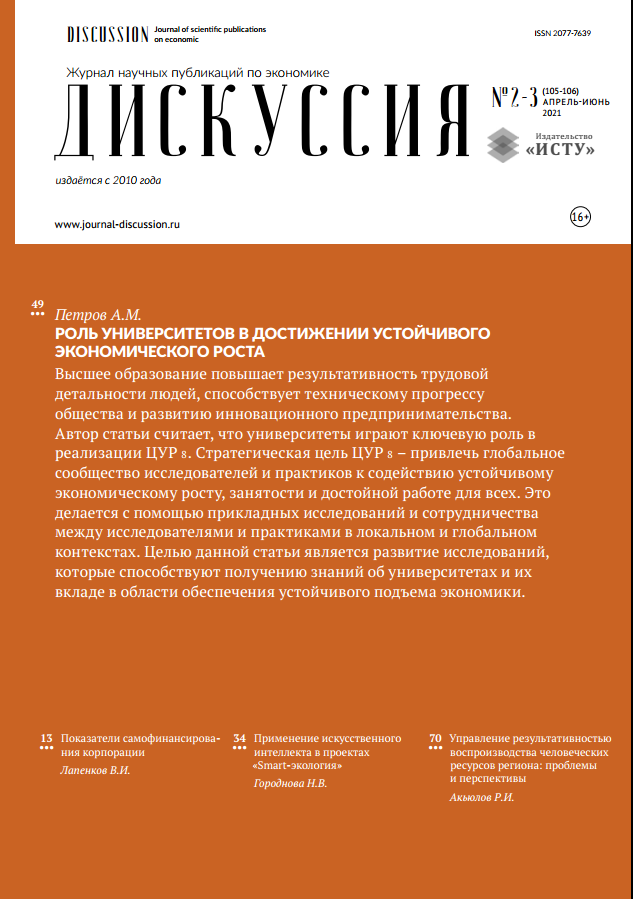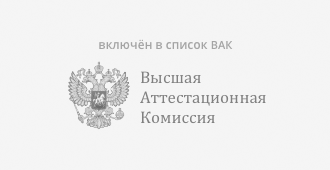Development of the system of remuneration for employees of the sales department at enterprises with high seasonality of demand
Keywords:
Self-financing, indicator, fund, fund network. JEL: G30Abstract
One of the main problems of a significant part of enterprises and organizations is the seasonality of demand, since it affects sales and business profitability. Seasonality is determined by the periods of growth and decline of various economic phenomena and processes.
The urgency of the problem increases against the background of the socio-economic crisis in
the country. Seasonal changes in demand hinder effective production planning, complicate
the formation of a sales policy, reduce liquidity and the amount of profit received. The article outlines the goals that should be achieved with the help of the organization’s management in conditions of high seasonality. Also, in the conditions of a decline in sales, a reduction in the number of employees, there are changes in the organization of labor and its payment. Based on this, the author has developed and presented a methodology for managing
the sales department in conditions of a high level of seasonality. The essence of the methodology lies in the variability of the KPI of sales managers depending on the season, and in
the fundamental rejection of the system of motivation (remuneration) based on the principle of “salary+percentage”. It is proposed to replace the “salary+percentage” motivation
system with a remuneration system in which payment is made for the amount of work performed, for example, depending on the number of calls to potential customers made during
the “low” season. During the “high” season, it is proposed to add a premium to the KPI system for fulfilling the sales volume. At the same time, the amount of the bonus should differ,
for example, managers who performed the largest amount of work during the “off-season”
should be paid an increased amount. A properly chosen remuneration system increases the
quality and productivity of labor, which will help to increase profits.
Downloads
Metrics
References
Горгорова В.В., Кобина Л.А. Мотивация персонала, страте-гия мотивации, материальное стимулирование, немате-риальное стимулирование, эффективность мотивации персонала // Инженерный вестник Дона. 2013. № 4 (27).С. 236.
Тихомиров А.Ф., Лембрикова М.М. Корпоративное управле-ние: системы стимулирования на основе KPI [Электронный ресурс]. Режим доступа: https://elib.spbstu.ru/dl/2/3705.pdf/download/3705.pdf (дата обращения: 02.05.2021).
Мягков Е. Как разработать, формализовать и вне-дрить систему KPI в компании [Электронный ресурс]. Режим доступа: http://www.cfin.ru (дата обращения: 02.05.2021).
Чернова Е. Как разработать и внедрить KPI для менеджера
по продажам. [Электронный ресурс]. Режим доступа: http://www.fd.ru/ (дата обращения: 02.05.2021).
Юдин М. Как правильно использовать систему KPI. [Электронный ресурс]. Режим доступа: http://www.fd.ru/ (дата обращения: 02.05.2021).
Синюк Т.Ю., Дрыгин Л.Н. Праксеологические основы фор-мирования ключевых показателей эффективности мене-джеров по продажам // Вестник Академии знаний. 2020. № 2 (37). С. 300–305.
Поташник Я.С., Анисимова А.Е., Закунова Е.Д., Караганова К.А. Оценка эффективности работы сотрудников ООО «Окна в городе» на основе системы KPI // Вестник Нижегородскогогосударственного педагогического университета им. К. Минина. 2020. № 2 (3). С. 187–193.
Евстафьев С.С., Прохорова Л.В. Совершенствование системы
мотивации менеджеров отдела продаж // Сборник статей Международной научно-практической конференции IV Уральского вернисажа науки и бизнеса. ФГБОУ ВО «Челябинскийгосударственный университет». 2017. С. 110–114.
Григорьева И.В., Хабазина Л.Н. Алгоритм формирования
системы оплаты труда работников организации по результа-там их труда // Вестник Российского университета кооперации. 2019. № 2 (36). С. 40–47.
Шильникова Е.В., Гринюк С.А., Кулешов В.К., Учайкина Е.С., Лимарева А.В. Мотивация персонала компании на основе ключевых компетенций эффективности // Экономическое возрождение России. 2012. № 1 (31). С. 37–48.
Аверьяскина А.С. Оценка результативности персонала на основе показателей системы KPI // Интеллектуальный потенциал XXI века: ступени познания. 2016. № 33. С. 123–129.
Москалева Е.Г. Внедрение системы мотивации персонала на базе KPI – ключевых показателей эффективности // Контентус. 2016. № 2 (43). С. 109–119.
Deeter-Schmelz D.R., Kennedy K.N., Goebel D.J. Understanding sales manager effectiveness: linking attributes to sales force values // Industrial Marketing Management Journal. 2002. Vol. 31. No. 7. Pp.617.
Sinclair D., Zairi M. Effective process management through performance measurement. Part 1 Iapplications of total qyuality-based performance measurement // Business Process Re-engineering & Management Journal. 1995. Vol. 1. No. 1. Pp. 75–88.
Maaja Vadi, Maive Suuroja. Training retail sales personnel in transition economies: applying a model of customer-oriented communication // Journal of Retailing and Consumer Services. 2006. Vol. 12. No. 5. Pp. 339–349
Downloads
Published
How to Cite
Issue
Section
Categories
License
Copyright (c) 2021 DISCUSSION | Journal of scientific publications on economic ISSN 2077-7639

This work is licensed under a Creative Commons Attribution-NonCommercial-NoDerivatives 4.0 International License.
Авторы, публикующие произведения в журнале «Дискуссия», соглашаются со следующими условиями:
- Авторы сохраняют за собой авторское право и предоставляют журналу право первой публикации произведения, одновременно лицензированной в соответствии с лицензией Creative Commons Attribution, позволяющей другим лицам пользоваться произведением с подтверждением авторства и первоначальной публикации в журнале «Дискуссия».
- Авторы вправе заключать с иными лицами лицензионные договоры на условиях простой (неисключительной) лицензии на использование опубликованного в журнале «Дискуссия» произведения (например, размещение его в базах данных университетов, публикация в книге), со ссылкой на его оригинальную публикацию в этом журнале.
- Автор гарантирует, что является правообладателем всех материалов, предоставляемых в редакцию, и что исключительные права на данные материалы не переданы или не предоставлены другим лицам.
- Авторам разрешено и рекомендуется размещать свое произведение в Интернете до и во время процесса подачи, поскольку это может привести к продуктивному обмену, а также к более раннему и более широкому цитированию опубликованных работ.
С момента загрузки произведения и сопроводительных материалов через раздел "Отправка материалов", автор полностью и безоговорочно принимает (акцептует) публичную оферту о заключении авторского соглашения об опубликовании произведения. В соотвтетствии с этим соглашением автор предоставляет издателю на безвозмездной основе неисключительную лицензию на использование созданного автором произведения.
С момента получения произведения и прилагаемых к нему материалов журнал "Дискуссия" вправе использовать полученные произведения без ограничений по своему усмотрению и в пределах всего срока действия исключительных прав, но с обязательным указанием имени автора (авторов) произведения, в том числе публиковать произведения (полностью или в сокращении) на территории всего мира, переводить на другие языки, направлять в репозитории научной информации, размещать в сети Интернет и использовать другими законными способами.









